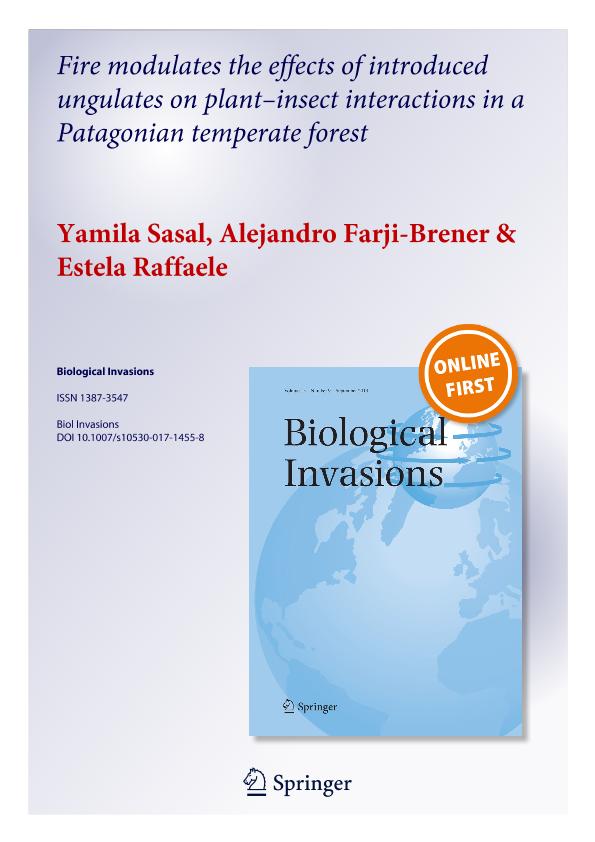Mostrar el registro sencillo del ítem
dc.contributor.author
Sasal, Yamila

dc.contributor.author
Farji Brener, Alejandro Gustavo

dc.contributor.author
Raffaele, Estela

dc.date.available
2018-09-06T15:13:27Z
dc.date.issued
2017-08
dc.identifier.citation
Sasal, Yamila; Farji Brener, Alejandro Gustavo; Raffaele, Estela; Fire modulates the effects of introduced ungulates on plant–insect interactions in a Patagonian temperate forest; Springer; Biological Invasions; 19; 8; 8-2017; 2459-2475
dc.identifier.issn
1387-3547
dc.identifier.uri
http://hdl.handle.net/11336/58510
dc.description.abstract
Disturbances like biological invasions and fire may affect in unexpected ways plant-animal interactions. In northwestern Patagonia, introduced ungulates (cattle, horses and deers) are widespread and very common occupying more than 50% of forests and shrublands, widely affecting these habitats. In addition, fire play a major role in creating landscape patterns in this region. We evaluated whether fire modify the impacts of introduced ungulates on plant-animal interactions. In a mature forest (unburnt) and in an early post-fire area (burnt) we used structural equation modeling (SEM) to analyzed the impacts of introduced ungulates on insect herbivory, pollination and pre-dispersal seed predation on Berberis darwinii, one of the most common understory shrub of temperate forests. We found that the effects of cattle on pollination and fruit set depended on the habitat condition (i.e. unburnt or burnt). Introduced ungulates in unburnt forest decreased fruit set through a reduction on pollinator visits. Conversely, introduced ungulates in burnt forest increased pollinator visits and flower production without affecting fruit set. On the other hand, damage patterns (herbivory and fruit/seed predation) were unaffected by cattle in both forests types. Either, low browsing pressure or induction of plant defences may explain our results. This study illustrates how modifications on biotic and abiotic conditions produced by fire may affect in complex ways the effect of introduced ungulates on plant-animal interactions.
dc.format
application/pdf
dc.language.iso
eng
dc.publisher
Springer

dc.rights
info:eu-repo/semantics/openAccess
dc.rights.uri
https://creativecommons.org/licenses/by-nc-sa/2.5/ar/
dc.subject
Berberis Darwinii
dc.subject
Cattle
dc.subject
Patagonian Forest
dc.subject
Plant-Animal Interactions
dc.subject
Post-Fire
dc.subject.classification
Otras Ciencias Biológicas

dc.subject.classification
Ciencias Biológicas

dc.subject.classification
CIENCIAS NATURALES Y EXACTAS

dc.title
Fire modulates the effects of introduced ungulates on plant–insect interactions in a Patagonian temperate forest
dc.type
info:eu-repo/semantics/article
dc.type
info:ar-repo/semantics/artículo
dc.type
info:eu-repo/semantics/publishedVersion
dc.date.updated
2018-08-31T13:48:37Z
dc.journal.volume
19
dc.journal.number
8
dc.journal.pagination
2459-2475
dc.journal.pais
Alemania

dc.journal.ciudad
Berlin
dc.description.fil
Fil: Sasal, Yamila. Consejo Nacional de Investigaciones Científicas y Técnicas. Centro Científico Tecnológico Conicet - Patagonia Norte. Instituto de Investigaciones en Biodiversidad y Medioambiente. Universidad Nacional del Comahue. Centro Regional Universidad Bariloche. Instituto de Investigaciones en Biodiversidad y Medioambiente; Argentina
dc.description.fil
Fil: Farji Brener, Alejandro Gustavo. Consejo Nacional de Investigaciones Científicas y Técnicas. Centro Científico Tecnológico Conicet - Patagonia Norte. Instituto de Investigaciones en Biodiversidad y Medioambiente. Universidad Nacional del Comahue. Centro Regional Universidad Bariloche. Instituto de Investigaciones en Biodiversidad y Medioambiente; Argentina
dc.description.fil
Fil: Raffaele, Estela. Consejo Nacional de Investigaciones Científicas y Técnicas. Centro Científico Tecnológico Conicet - Patagonia Norte. Instituto de Investigaciones en Biodiversidad y Medioambiente. Universidad Nacional del Comahue. Centro Regional Universidad Bariloche. Instituto de Investigaciones en Biodiversidad y Medioambiente; Argentina
dc.journal.title
Biological Invasions

dc.relation.alternativeid
info:eu-repo/semantics/altIdentifier/doi/https://dx.doi.org/10.1007/s10530-017-1455-8
dc.relation.alternativeid
info:eu-repo/semantics/altIdentifier/url/https://link.springer.com/article/10.1007%2Fs10530-017-1455-8
Archivos asociados
